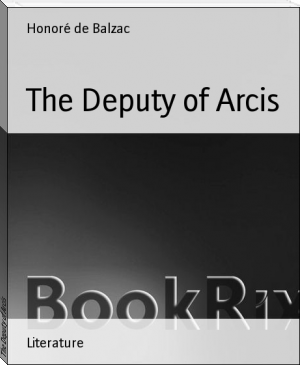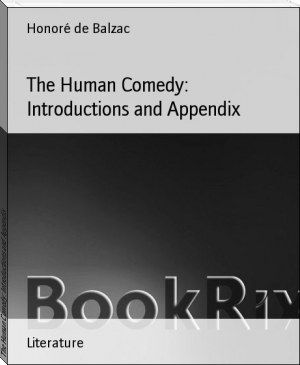The Deputy of Arcis, Honoré de Balzac [bts book recommendations .txt] 📗

- Author: Honoré de Balzac
Book online «The Deputy of Arcis, Honoré de Balzac [bts book recommendations .txt] 📗». Author Honoré de Balzac
These words, you will remember, madame, were those in which Sallenauve answered his questioners at the preparatory meeting. Then followed in large letters:--
THE RIOT HAS BEEN SUPPRESSED. WHO WILL PROFIT BY IT?
That sheet of paper did marvels; it completely foiled the efforts of Monsieur de Trailles, who, throwing off the mask, had spent his day in perorating, in white gloves, on the market-place and from the steps of the electoral college.
This evening the result is known; namely, two hundred and one votes cast: two for Beauvisage; twenty-nine for Simon Giguet; one hundred and seventy for Sallenauve.
Consequently, Monsieur Charles de Sallenauve is proclaimed Deputy.
PART III. MONSIEUR DE SALLENAUVE
I. THE SORROWS OF MONSIEUR DE TRAILLES
During the evening which followed the election in which he had played a part so humiliating to his vanity, Maxime de Trailles returned to Paris. It might be supposed that in making, on his arrival, a rapid toilet and ordering his carriage to be instantly brought round, he was hastening to pay a visit to the Comte de Rastignac, minister of Public Works, to whom he must have desired to render an account of his mission, and explain as best he could the reasons of its ill-success.
But another and more pressing interest seemed to claim him.
"To Colonel Franchessini's," he said to his coachman.
Arriving at the gate of one of the prettiest hotels in the _quartier_ Breda, and nodding to the concierge, he received an affirmative sign, which meant, "Monsieur is at home"; and at the same time a valet appeared on the portico to receive him.
"Is the colonel visible?" he asked.
"He has just gone into madame's room. Does monsieur wish me to call him?"
"No, I'll wait for him in the study."
Then, like one familiar with the house, and without waiting for the servant to usher him, he entered a large room on the ground-floor, which looked into a garden, and was filled with a miscellaneous collection of articles testifying to the colonel's habits and tastes. Books, charts, and maps certainly justified the word "study"; but, as a frantic sportsman and member of the Jockey Club, the colonel had allowed this sanctum of mental labor and knowledge to become, by degrees, his smoking, fencing, and harness room. Pipes and weapons of all shapes and all lands, saddles, hunting-whips, spurs, bits of many patterns, foils and boxing-gloves formed a queer and heterogenous collection. However, by thus surrounding his daily life with the objects of his favorite _studies_, the colonel proved himself a man who possessed the courage of his opinions. In fact, he openly said that, beyond a passing notice, there was no reading worth a man's attention except the "Stud Journal."
It is to be supposed, however, that politics had managed in some way to slip into this existence devoted to muscular exercise and the hippic science, for, from a heap of the morning journals disdainfully flung upon the floor by the worthy colonel, Monsieur de Trailles picked up a copy of the legitimist organ, in which he read, under the heading of ELECTIONS, the following article:
The staff of the National Guard and the Jockey Club, which had
various representatives in the last Chamber, have just sent one of
their shining notabilities to the one about to open. Colonel
Franchessini, so well known for his ardor in punishing the
refractories of the National Guard, has been elected almost
unanimously in one of the rotten boroughs of the civil list. It is
supposed that he will take his seat beside the phalanx of other
henchmen, and show himself in the Chamber, as he has elsewhere,
one of the firmest supporters of the policy of the _present order
of things_.
As Maxime finished reading the article, the colonel entered.
After serving the Empire for a very short time, Colonel Franchessini had become one of the most brilliant colonels of the Restoration; but in consequence of certain mists which had risen about the perfect honorableness of his character he had found himself obliged to send in his resignation, so that in 1830 he was fully prepared to devote himself in the most ardent manner to the dynasty of July. He did not re-enter military service, because, shortly after his misadventure he had met with an Englishwoman, enormously rich, who being taken with his beauty, worthy at that time of the Antinous, had made him her husband, and the colonel henceforth contented himself with the epaulets of the staff of the National Guard. He became, in that position, one of the most exacting and turbulent of blusterers, and through the influence of that quality combined with the fortune his wife had given him, he had just been elected, as the paper stated, to the Chamber of deputies. Approaching the fifties, like his friend de Trailles, Colonel Franchessini had still some pretensions to the after-glow of youth, which his slim figure and agile military bearing seemed likely to preserve to him for some time longer. Although he had conquered the difficulty of his gray hair, reducing its silvery reflections by keeping it cut very close, he was less resigned to the scantiness of his moustache, which he wore in youthful style, twirled to a sharp point by means of a Hungarian cosmetic, which also preserved to a certain degree its primitive color. But whoso wants to prove too much proves nothing, and in the black which the colonel used there was noticeably a raw tone, and an equality of shade too perfect for truth of nature. Hence his countenance, swarthy and strongly marked with the Italian origin indicated by his name, had an expression of singular rigidity, to which his features, now become angular, his piercing glance, and his nose like the beak of a bird of prey, did not afford the requisite corrective.
"Hey, Maxime!" he cried, shaking hands with his visitor, "where the devil do you come from? It is more than a fortnight since I have seen you at the club."
"Where do I come from?" replied Monsieur de Trailles. "I'll tell you presently; but first let me congratulate you on your election."
"Yes," said the colonel, with apparent indifference, "_they_ would put me up; but I assure you, upon my honor, I was very innocent of it all, and if no one had done more than I--"
"But, my dear fellow, you are a blessed choice for that arrondissement; I only wish that the electors I have had to do with were equally intelligent."
"What! have you been standing for election? I didn't suppose, taking into consideration the--rather troubled state of your finances, that you could manage it."
"True, and I was not electioneering on my own account. Rastignac was uneasy about the arrondissement of Arcis-sur-Aube, and he asked me to go down there for a few days."
"Arcis-sur-Aube? Seems to me I read an article about that this morning in one of those cabbage-leaves. Horrid choice, isn't it?--some plasterer or image-maker they propose to send us?"
"Precisely; and it is about that very thing I have come to see you before I see the others. I have just arrived, and I don't want to go to Rastignac until after I have talked with you."
"How is he getting on, that little minister?" said the colonel, taking no notice of the clever steps by which Maxime was gravitating toward the object of his visit. "They seem to be satisfied with him at the palace. Do you know that little Nucingen whom he married?"
"Yes, I often see Rastignac; he is a very old acquaintance of mine."
"She is pretty, that little thing," continued the colonel, "very pretty; and I think, the first year of marriage well buried, one might risk one's self in that direction with some success."
"Come, come," said Maxime, "you are a serious man now, a legislator! As for me, the mere meddling in electoral matters in the interests of other people has sobered me."
"Did you say you went to Arcis-sur-Aube to hinder the election of that stone-cutter?"
"Not at all; I went there to throw myself in the way of the election of a Left-centre candidate."
"Pah! the Left, pure and simple, is hardly worse. But take a cigar; these are excellent. The princes smoke them."
The colonel rose and rang the bell, saying to the servant when he came, "A light!"
The cigars lighted, Monsieur de Trailles endeavored to prevent another interruption by declaring before he was questioned that he had never smoked anything more exquisite. Comfortably ensconced in his arm-chair, the colonel seemed to offer the hope of a less fugacious attention, and Monsieur de Trailles resumed:--
"All went well at first. To crush the candidate the ministry wanted to be rid of,--a lawyer, and the worst sort of cad,--I unearthed a stocking-maker, a fearful fool, whom I persuaded to offer himself as candidate. The worthy man was convinced that he belonged to the dynastic opposition. That is the opinion which, for the time being, prevails in that region. The election, thanks to me, was as good as made; and, our man once in Paris, the great Seducer in the Tuileries had only to say five words to him, and this dynastic opposer could have been turned inside out like one of this own stockings, and made to do whatever was wanted of him."
"Pretty well played that!" said the colonel. "I recognize my Maxime."
"You will recognize him still farther when he tells you that he was able, without recourse to perquisites, to make his own little profit out of the affair. In order to graft a little parliamentary ambition upon my vegetable, I addressed myself to his wife,--a rather appetizing provincial, though past her prime."
"Yes, yes, I see; very good!" said Franchessini; "husband made deputy--satisfied--shut his mouth."
"You are all wrong, my dear fellow; the pair have an only daughter, a spoilt child, nineteen years old, very agreeable face, and something like a million in her pocket."
"But, my dear Maxime, I passed your tailor's house last night, and it was not illuminated."
"No; that would have been premature. However, here was the situation: two women frantic to get to Paris; gratitude to the skies for the man who would get them an introduction to the Palais-Bourbon; the little one crazy for the title of countess; the mother transported at the idea, carefully insinuated by me, of holding a political salon,--you must see all that such a situation offers, and you know me too well, I fancy, to suppose that I should fall below any of its opportunities."
"Quite easy in mind as to that," said the colonel, getting up to open a window and let out the smoke of their two cigars.
"I was on the point," continued Maxime, "of pocketing both daughter and _dot_, when there fell from the skies, or rather there rose from the nether regions, a Left candidate, the stone-cutter, as you call him, a man with two names,--in short, a natural son--"
"Ha!" said the colonel, "those fellows do have lucky stars, to be sure. I am not surprised if one of them mowed the grass from under your feet."
"My dear friend," said Maxime, "if we were in the middle ages, I should explain by magic and sorcery the utter discomfiture of my candidate, and the election of the stone-man, whom you are fated to have for your colleague. How is it possible to believe, what is however the fact,





Comments (0)